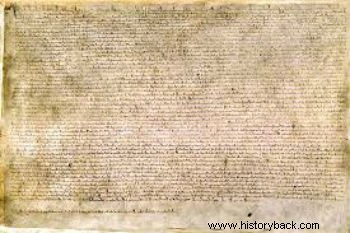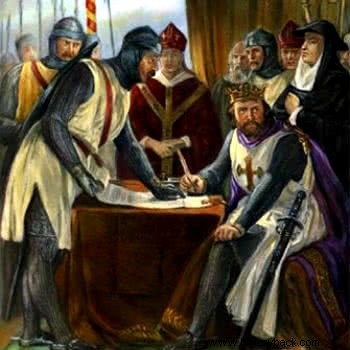The Magna Carta orMagna Carta it was a document that guaranteed certain limitations of the king's power in relation to English nobles.
It is considered the first constitutional document of the western world and precursor of Human Rights.
Historical Context
During the Late Middle Ages, kings were considered as “primus inter pares”, that is, the first among their equals. They were undoubtedly more important than the nobles, but they needed to negotiate their support through marriages and military alliances.
Thus, the king exercised effective power only in his domains and the nobles, in their respective fiefs. There were royal taxation and oaths of allegiance and allegiance, but that was no guarantee that the nobility would always be faithful to the sovereign.
Read more about the Late Middle Ages.

One strategy used by medieval kings to avoid wars between nobles was to engage them in combat against a common enemy. King João Sem Terra, who reigned in England from 1199 to 1216, used this device in numerous wars against the French. However, the plan didn't work out.
The wars in northern France proved disastrous, expensive and did not bring the lands that English nobles had hoped for. Far from looking for another objective, King João Sem Terra demanded more and more money, men and arms from the English nobility in order to continue the war against the French. If they refused, he confiscated their property and riches.
Also the character of the king did not make him very popular among his allies. He sent his ex-wife to prison, starved his opponents to death and was accused of murdering his own nephew.
Thus, several barons united against the king demanding that he pass to respect laws elaborated by a group of nobles. King João Sem Terra denied it, claiming that a king should not submit to human laws, only divine ones. In this way, the barons besieged London and forced the king to negotiate.
In June 1215, the king reluctantly signed the document called the Magna Carta. It was the first time in the history of the West that the king had his power limited by the laws of men and not of God.
In fact, the Magna Carta did not bring the desired peace. On the contrary:it unleashed the civil war between the barons and King João Sem-Terra. It was only after the death of the king and Magna Carta that it was reissued three times throughout the 13th century that it was accepted by English society.

Main Articles of the Magna Carta
The main articles of the Magna Carta, for the Modern Era, are:
- no “free man” could be arrested without trial;
- the institution of habeas corpus;
- the principle of presumption of innocence;
- to pay taxes it was necessary to have representation (no taxation without representation ).
The first item must be read according to the society of the time, as only the nobility was considered free. Rural workers were subject to the local lord's law. In this way, freedom was only for a small portion of the population.
The last example will serve as an argument, in the 18th century, to the American colonists to ask for more rights to the Thirteen Colonies. After all, the colonists paid taxes but were not represented in the British Parliament.
Legacy
The Magna Carta was not applied at the time it was written. Despite this, it inspired different thinkers in later centuries to fight against the abuses of political authority.
The Magna Carta, for example, inspired Americans to write the United States Constitution. It is also invoked as the first attempt to prevent abuses of authority by constitutionalists around the world.
Read more:Human Rights
Brazilian Magna Carta
Brazil also has a Magna Carta, the 1988 Constitution. Since the country became independent, it has had six Constitutions.
Some were drawn up by a democratically elected National Constituent Assembly. In this case, we say that the Magna Carta has been enacted.
However, the 1938 Constitution was imposed by President Getúlio Vargas, without consulting voters. In this case, the Constitution was granted, that is, imposed by a ruler on the country.
Read more:
- Puritan Revolution
- Glorious Revolution
- Brazilian Constitutions
